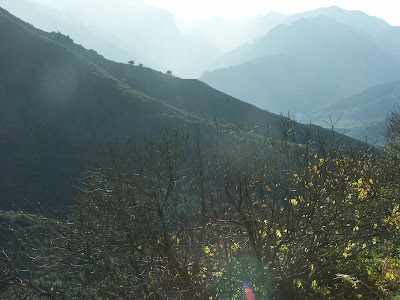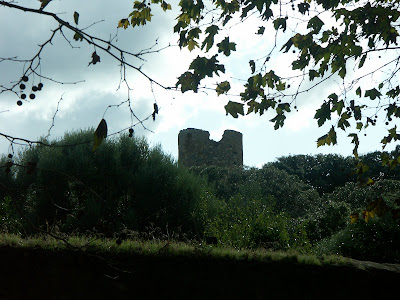

December 8th
We saw posters up around the town advertising, in Corsican, some kind of celebration for 'la festa di a nazione'. It is held on the feast of the Immaculate Conception, because in 1735, they chose the Immaculate Virgin as protectress of the island. I wonder whether getting the big guns out in the patron saint business (Mary, St Peter…) caused problems when going to war with someone who had adopted the same saint. Maybe having someone with awesome, universal power was worth it. The alternative, choosing someone genuinely linked to the place, probably would have posed problems too – a showdown between some dodgy local saint and the mother of God wouldn’t have inspired that much confidence.
Me and Lija went down to the church at seven, and found the mass still going on with the doors open, despite the cold, and people spilling out onto the steps, chatting and smoking. I started talking to one of my students and asked him to tell us what was going to happen. He gave us a long and garbled description of how they would carry God out, and how his dad was one of the people carrying him, except some years he didn’t if he had a bad back, and how there was blood on God’s head and hands and feet and side, but it wasn’t real, they drew it on with felt tip. He was very excited to be explaining everything to these strange ignorant foreigners, and took us into the church to see the statues, explaining how there were lots of photos of when they killed God, and how a statue showing John the Baptist baptising Christ was John helping his friend who had ‘mal au cœur’ (Jesus had his hand on his chest). It was terribly endearing, and made me wonder about how little children experience religion – it is such an epic fairytale to them, with love and tragedy and sacrifice.
Eventually the mass ended and a column of men in white robes with little capes in red, or green, or purple, filed out singing. It wasn’t God that they carried out, but Mary, a statue in painted wood with her outstretched arm holding a dangling rosary and an arch of lilies above her head. The men carrying her had leather slings like shoulder holsters, and one was so frail I thought he might fall down the church steps, but the others supported him as well as the statue. We filed after them into the windswept square and down towards the supermarket. It was strange to see teachers, students, the cleaning ladies from school, all these people from day to day life, in such a different situation. The little streets that we walk down every day to get to the bank or the shops seemed transformed with hundreds of people shuffling along singing and praying.
We stopped for prayers by the supermarket, under olive, clementine and palm trees hung with electric snowflakes swinging wildly in the wind. Then back into the main square, under strings of silver lights and the Christmas greeting in Corsican, ‘Pace e Salute’ with the moor’s head between the two. We walked out towards the sea, and stopped by the crib scene on a street corner to pray for sailors. I don’t know why Mary is called the Star of the Sea – is it just because of the similarity between Mare and Maria? At each stop, the men around the statue would strike up the same Latin hymn, which had the same keening harmonies as the Corsican polyphony we have heard.
The centre of Ile Rousse is tiny, so we were soon back at the church where more prayers were said, and they sang Dio vi salvi Regina, the national hymn of Corsica. The acoustic is good, and the song was so beautiful. It sounds like a love song, a lament, and a call to arms at the same time, and comes to these swift, sweet resolutions again and again, but breathlessly continues. When it was over we queued up to touch the statue’s feet, and a little scuffle broke out among some old women, who were admonishing those who took the flowers out of Mary’s garland.
Afterwards, we went down to the market, which is like a Greek temple but made in wood with a tiled roof, where food had been laid on by the mairie. For a while we gorged ourselves on the free beignets au brocciu, little doughnuts stuffed with brocciu, the sweetish sheep’s milk cheese they make here, which is something like ricotta. There was cheese bread too, and wine, but although I had already had supper I had to invest ten euros to try the full meal that was on offer. They had a little barbeque where they were grilling figatellu, the famous pork liver sausage which I have heard so much about, and in a high sided pot over a gas burner a man was using what looked like a broom handle to pound something mysterious. The figatellu, served like a hotdog in a baguette, was like the most salty, fatty, delicious sausage, and it turned out that the pot was full of polenta made with chestnut flour. They turned the brown paste out into a white sheet on a table, and the man wrapped it up and hugged it tenderly to him like a child. When it was firm, he unpeeled it from the cloth like an enormous plum pudding, dusted it with more flour, and started hacking off chunks for the eager crowd that had gathered. It was naturally sweet, warm and claggy, good with the hot sausage oozing its salty fat, and the slices of fresh cheese they were serving. I couldn’t finish my huge piece, and on the advice of several sage Corsican men I took it home for breakfast. Apparently you can either eat it cold with milk, or form it into a patty and dry fry it, which is what I did. With some fig and walnut jam, it was very nice second time round, with a sweet, smoky, nutty flavour.
It seemed as if the whole town had turned out, and many people from the surrounding villages too. I suppose the ceremony has the double appeal of Catholicism and nationalism, and we were button-holed late in the evening by Pierre, a teacher at the lycée, about Corsica’s political problems, the years of depopulation and huge losses in the second world war, the influx of radicalised Corsican students who had studied on the continent in the 60s and who fuelled the nationalist revival, the political infighting and deaths in Ile Rousse’s town square in the 90s, and the current appeals to dissuade speculation by restricting large purchases of land to people who have lived on the island for several years. I had worried that foreigners wouldn’t be welcome at a celebration of Corsican identity but, despite some curious looks, people were friendly and welcoming, especially since most of the children there knew me and came up to say hello. I got quite merry on the wine, despite the huge quantity of starch and fat which I managed to consume, and went home very happy.





















